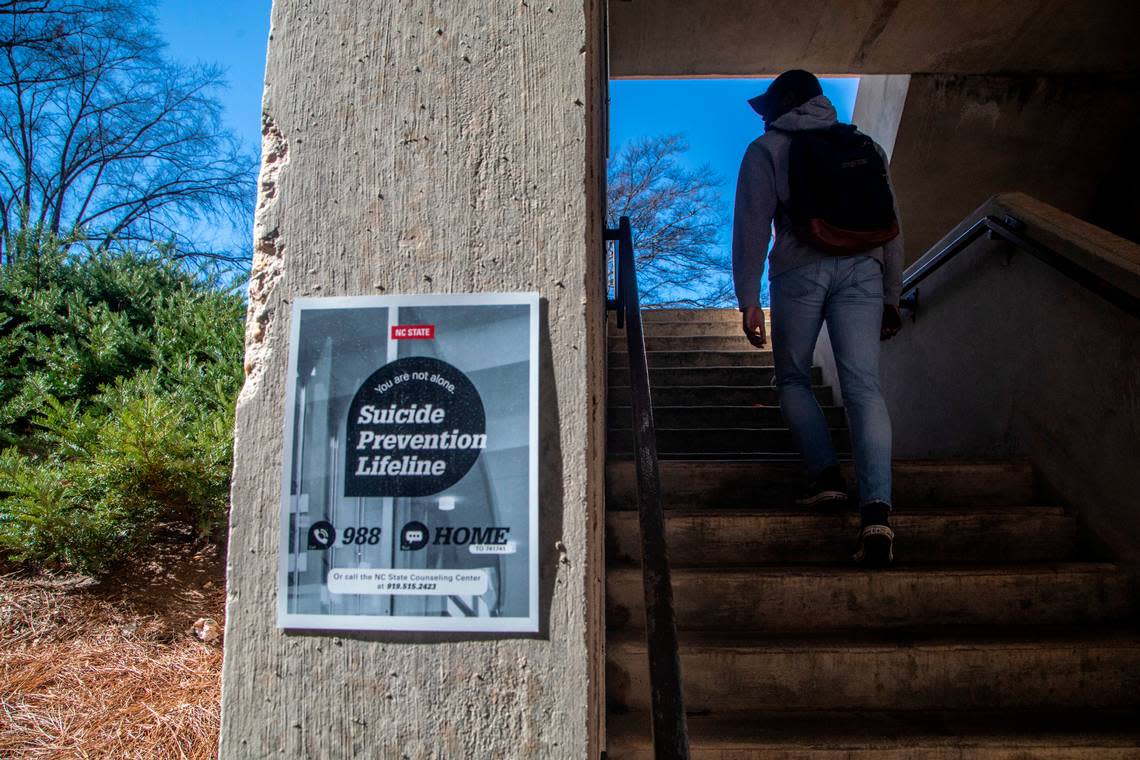3 students in one NC State program died by suicide. Let’s address it | Opinion

Heartbreaking news of a student suicide jarred the North Carolina State University community this week.
The student was part of the engineering program, according to university officials. That marks eight student deaths on N.C. State’s campus this school year, five of which have been students in the College of Engineering.
Three of those losses occurred by suicide — a disturbing pattern.
In a message to engineering students earlier this week, Dean Louis Martin-Vega said he and his leadership team are “very concerned about the well-being and mental health of our students, faculty, and staff.”
Suicide is among the leading causes of death for college students. The availability of mental health resources for young people struggles to keep up with demand, which has only grown in recent years amid the pandemic and other hardships. The U.S. surgeon general has declared it a crisis.
It should never have to end in tragedy. But university administrators seem acutely aware of the problem, and they have vowed to do what they can to improve student mental health. They’ve stepped up funding for mental health services and established a task force of students, faculty and staff who will recommend policy changes.
That’s promising, and important. Mental health is an issue that affects everyone, of all ages, majors and backgrounds, and it should be treated as such. But they ought to also take a closer look at the engineering program to understand why those students might be struggling perhaps more than most.
My brother is an engineering student at N.C. State, and I’ve seen firsthand the toll it takes. The engineering program is prestigious and competitive. The admissions process is separate from that of the university as a whole, and more selective. After the first year, engineering students undergo another application process, through which they are placed into a specific engineering major. The curriculum is rigorous. It’s intense, like a pressure cooker — difficult and laborious in a way that sometimes makes it feel impossible to succeed, at least not without sacrificing something else.
Research shows that students in “high-achieving” environments are an at-risk group for anxiety and depression. In 2019, Active Minds surveyed thousands of “high-performing” college students across the country and found that the vast majority feel overwhelmed and in need of mental health services. It’s why Ivy League students often experience higher rates of mental illness and suicidal ideation than their peers.
In fact, academic stress appears to be the single most dominant factor affecting student mental health. We don’t know what contributed to suicides this year at N.C. State, but competitive environments only increase the stress that students feel.
In light of recent events, the College of Engineering has begun increasing support for its students. There are now two counselors embedded on Centennial Campus, where the engineering school is housed, and officials plan to deploy volunteers to check in on students throughout the semester. They’ve scheduled Mental Health First Aid training for faculty and staff. Those things probably should have been put in place long ago, but it’s nonetheless good to see it happening now.
Still, it’s going to take more than that. Wellness resources and services can help address the problem, but it’s imperative for university leaders to figure out what’s causing the problem in the first place. Why do so many students feel like they’re drowning? Is it an inability to cope with stress, or is it unrealistic expectations? Do they need to manage their time better, or is the workload too demanding?
Talk to students and figure out what the biggest pressure points are. Audit the program, audit the classes — determine whether the demands placed on these students are reasonable. There’s a difference between challenging students to be successful and pushing them so far they struggle to be successful at all.
Striving for academic excellence and protecting the mental health of students can be a tricky balance. N.C. State has a strong engineering program, and it’s strong because it’s rigorous and competitive. Again, though, it’s about balance, and the scales seem to be tipping the wrong way. I worry about my brother when I see the stress written on his face, or when he texts me to say how much he’s dreading the upcoming semester before classes even start. I worry even more when I see the headlines and think that could easily be him.
Even just one student lost to suicide is too many. Five is especially alarming. Three in the same program, in the same year, is a crisis. Let’s do something about it.
Paige Masten is a Charlotte-based opinion writer and member of the Editorial Board.
